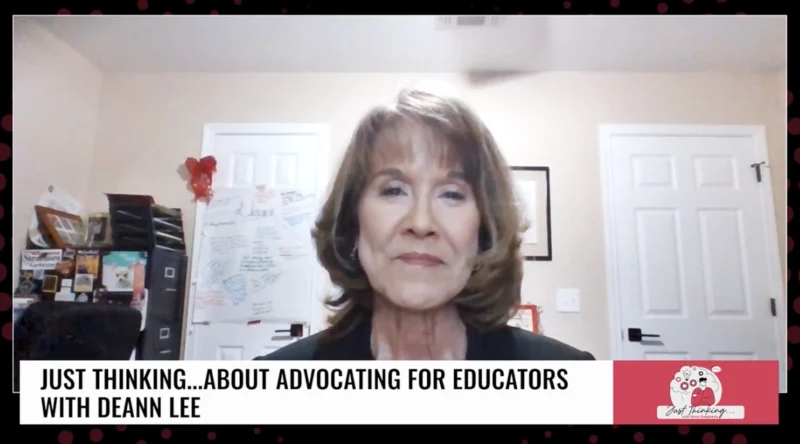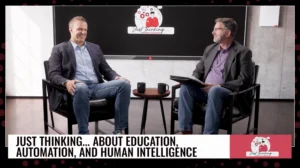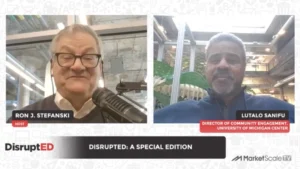Experience, Technology Highlight 2018 EdTechTeacher Summit in Boston
This year’s second EdTechTeacher Summit brought teachers and other education professionals together from all over the country to the Revere Hotel in Boston, Mass. for two days of hands-on technology integration sessions this week.
The summit featured a number of high-profile keynote speakers, including Monica Burns, Ed.D, author of Tasks Before Apps, and Ayanna Howard, Ph.D., the Linda J. and Mark C. Smith professor and chair of the School of Interactive Computing in the College of Computing at the Georgia Institute of Technology.
Since Tuesday, those attending have shared powerful statements from speakers via Twitter, providing a glimpse in to the strong sense of purpose and re-invigoration fostered during the summit:
"If teaching came with a GPS, it would mostly say 'Recalculating'." Create Combustible Classrooms session at #ettsummit
— Tom Daccord (@thomasdaccord) November 6, 2018
“You learn to hold your breath because you breathe in some water.” We can’t save students from failure through lecturing learning. @ShawnMcCusker #ettsummit
— Sarah Olson (@ADKLibraryLady) November 7, 2018
"Willingness to learn: the most important attribute to advancement." @rmbyrne #ettsummit
— Rosey McQuillan (@romcquill) November 7, 2018
The event kicked off with several pre-conference activities on Monday, giving early-arriving attendees the opportunity to join one of seven full-day immersive workshops. These included a session titled “Leading Teachers from Monday to Someday” held by EdtechTeacher CEO and Co-Founder Tom Daccord himself, which focused on helping teachers implement technology in small steps to build their confidence and lay a foundation for meaningful use of education technology in the future.
The message underlying Daccord’s workshop was reflected in the organization of the more than 60 sessions offered at the summit. Teachers chose from workshops in three different areas- edtechNow, edtechNext, and edThought- which focused respectively on accessible tools teachers can use in the classroom right away, technologies that are up-and-coming in education, and broader ideas related to edtech.
Session topics ranged from the anticipated and practical (“Interactive Notebooks Gone Digital”, “Podcasting in EDU”) to the quirky and unforeseen (“Digital Escape Rooms”, “Exploring Anne Frank’s Reality: A Virtual Tour.”)
Several speakers highlighted the growing share of AR and VR tools and apps that teachers have at their disposal for use in the classroom. Robert Kalman, Digital Design Teacher and Tech Integrator at Eric S. Smith Middle School in Ramsey, New Jersey, shared more about why he attended the conference to lead his session “Exploring Augmented Reality in EDU.”
His speech focused on affordable new AR tools teachers can use in their classrooms today without having to purchase expensive devices.
“Over the last couple years, the advancements with the processors in phones and tablets have made AR and VR apps much more accessible. My presentation was kind of broken down into AR consumption and AR creation. The exciting thing is that students now cannot only consume AR and VR experiences, but they can make their own using a bunch of different tools, which is cool” he said.“ That can branch into a variety of projects that bring in different content areas.”
The brilliant roboticist and rocket scientist @robotsmarts kicks off #ettSummit Boston: "Robotics matters because is the future our students are growing up in." pic.twitter.com/k9JESWlSL9
— EdTechTeacher (@EdTechTeacher21) November 6, 2018
Regarding the role that technology is playing in education, Kalman emphasized that AR and VR are not slated to replace existing teaching methods. Rather, they enhance learning already happening in the classroom by providing context for instructional content and by increasing student engagement.
“EdtechTeacher really tries to focus on not just grasping for what’s the shiny new toy, but [being] more responsible and open-minded in terms of still doing what is pedagogically sound. So, AR and VR give the opportunity for students to experience different things, whether it’s digitally seeing it, or experimenting with it in a different sort of way,” Kalman said. “Definitely the powerful thing is the engagement. If students are engaged, they’ll be more motivated and interested and put forth higher effort and it will ultimately create valuable learning experiences.”
Pre Conference Workshops have started at #ETTsummit. Ts are taking a deep dive into topics here at the #RevereHotel. pic.twitter.com/ShtCxEvvPS
— EdTechTeacher (@EdTechTeacher21) November 5, 2018
Kalman also provided some broader insight into the value the conference had for teachers who may need some inspiration.
“The whole thing is very well organized. Definitely a very positive energy. It’s more of a boutique sort of conference. It’s not too big. Everyone is there because they want to be there and [there are] very high-quality presenters,” he said.
Kalman underscored how much he appreciates the summit’s focus on responsibility and digital citizenship in schools’ use of technology.
“The unique part is that [EdtechTeacher] always tries to place emphasis on not just doing the technology for technology’s sake, but also discussing the potential implications of using these technologies” he noted. “For instance, with augmented reality and virtual reality, are there possible consequences for people having these devices strapped to their heads? If used in the wrong way, can AR and VR cause problems? Because if you’re augmenting reality, could people augment it to create falsehoods?”
EDTechTeacher’s next conference will be the Innovation in Education Summit in San Diego on Feb. 4-5, 2019.








